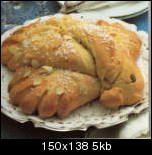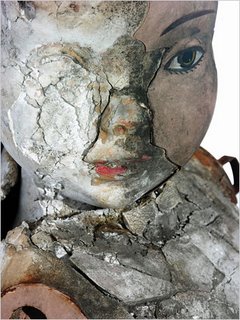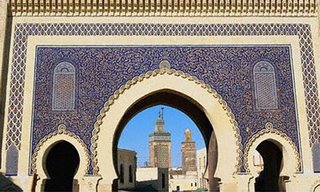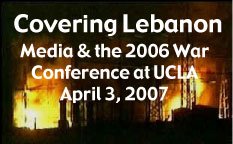Happy Easter!
Wishing you many beautiful Easter eggs and a sunny Easter Sunday.
One of my happiest Easter memories as a child was when my father would design Easter egg
 hunts, complete with fantastic clues. At the end, we would envariably find a rabbit (for a few yeasr, anyway), given to us by Zio. We would name the rabbit Pasquale (that's right, every year). Pasquale would pass his time getting bigger and bigger and chewing on his cage, until one day, Zio would decide he needed to get on with his life and join his jackrabbit cousins in the fields behind our house.
hunts, complete with fantastic clues. At the end, we would envariably find a rabbit (for a few yeasr, anyway), given to us by Zio. We would name the rabbit Pasquale (that's right, every year). Pasquale would pass his time getting bigger and bigger and chewing on his cage, until one day, Zio would decide he needed to get on with his life and join his jackrabbit cousins in the fields behind our house. I don't have room for a rabbit, but I try to make Colomba di Pasqua every year (except this year- the pilot light is out )
I don't have room for a rabbit, but I try to make Colomba di Pasqua every year (except this year- the pilot light is out )If you want to try it yourself, this is a pretty good recipe- it's not exactly like that of Lucca, but pretty close.
Easter Dove Bread #1
Colomba di Pasqua
Makes 1 Loaf
The Colomba is a sweet bread similar to panettone but it is shaped like a dove and made during Easter all over Italy, most of it commercially these days. This bread, along with many others, was prepared on Good Friday and Holy Saturday, and eaten during Easter week. The recipe has come down through the Galasso family.
1/4 cup warm water (110º to 115ºF)
1 tablespoon active dry yeast
1/2 cup warm milk
2/3 cup sugar
8 tablespoons (1 stick) butter or margarine, melted
1 tablespoon grated lemon zest
1 tablespoon vanilla extract
3 large eggs, at room temperature
3 large egg yolks, at room temperature
4 1/2 to 5 cups King Arthur™ Unbleached, All-Purpose Flour
3/4 teaspoon salt
1 large egg white, slightly beaten
1 tablespoon turbinado (raw sugar) or coarse brown sugar
In the large bowl of an electric mixer, put the warm water and yeast and stir to dissolve. Let the mixture proof for 10 minutes. Add the milk, sugar, butter, lemon zest, vanilla, whole eggs, and egg yolks and beat on low speed to blend well. Then beat on medium speed for 3 minutes. Add 4 cups of the flour and the salt and beat on medium speed. Gradually add the remaining flour a little at a time, until a soft dough is formed. You may not need all the flour.
Turn the dough out onto a floured surface and knead until smooth and elastic, about 8 to 10 minutes. Place the dough in an oiled bowl. Cover and let rise until doubled in bulk, about 1 hour.
Punch the dough down, divide it in half, and form 2 balls. Place 1 ball width-wise on a greased baking sheet and gently flatten it into a cylinder 10 inches long and 5 inches thick. Curve the dough slightly in the center.
Pat the other ball of dough into a triangle over the cylinder to form a T. Twist the top third of the body to the right; pinch and shape to form the dove's head, neck, and beak. Twist the bottom third to the left; pull and stretch it into a fan shape to form the tail. With a scissors, cut deep slashes in the wings and tail to resemble feathers.
Cover the dove with a sheet of buttered waxed paper and a towel. Let the bread rise in a warm place until almost doubled, about 20 minutes. Do not let it overrise or the shape will be lost in baking.
Preheat the oven to 350ºF.
Gently brush the dove all over with the egg white and sprinkle the wing tips and tail section with the brown sugar. Bake for about 50 minutes, or until the bread is golden brown. Carefully transfer the bread to a rack to cool.
This recipe is from NELLA CUCINA by Mary Ann Esposito, published by William Morrow and Company Inc., in 1993.
This year Western and Othordox Easter fall on the same day, so...
The disappeared have voices I

~Courtesy of the Museo del barrio
And, then you remember- there are desaparacidos now- only we don't call them that - and it is their governments which are cooperating with the banality of evil which is our government meant to render them as such. And, perhaps, you may wonder- what art will their children produce to commemorate their calvary?
“The Disappeared” (“Los Desaparecidos”) continues through June 17 at El Museo del Barrio, 1230 Fifth Avenue, at 104th Street, East Harlem; (212) 831-7272, elmuseo.org.There may have been a more moving show of contemporary political art in the city this season than “The Disappeared” at El Museo del Barrio, but if so, I missed it. The title refers to a peculiarly chilling form of violence associated with political upheavals in Latin America over the last 40 years, one that is now becoming more common in Iraq.
A man leaves for work one morning, but doesn’t come home at the end of the day, or later that night, or the next day. A week passes. Relatives suspect that the missing man, who may or may not have had risky political ties, has been arrested or kidnapped. But they don’t know by whom, or where he’s been taken, or if he’s alive or dead.
He’s one of the disappeared, “los desaparecidos,” the victim of terrorism through stealth removal. A death permits mourning, assignment of blame, a possibility of closure. Disappearance generates uncertainty, paralyzes action, leaves an open wound. If I say nothing, a survivor thinks, maybe my husband, or child, or mother, or wife will be spared, even returned. If I inquire or accuse, I may seal their fate. As often as not, fear wins out.
The 15 artists in the show are all from Latin American countries that experienced totalitarian regimes in the late 20th century, when almost every family had friends who disappeared or were themselves forced into hiding or exile. Directly or indirectly, their art is about these experiences.
(Review by Holland CotterNYT)
If you do nothing else in New York, go see this show.
Fes, mon amour...

Yet even as it opens, Fez remains a hidden city. High windowless walls hem narrow passageways adorned with flowing Arabic scripts, impenetrable to the outsider. Many men are hooded, many women veiled. In its hundreds of mosques, barred to non-Muslims, worship proceeds beyond public view. Talismans protect from the unseen world of djinns.
An “enchanted labyrinth sheltered from time,” was the reverent assessment of the writer Paul Bowles, who lived in Tangier.
Fez speaks in symbols. Few places on Earth seem so imbued with buried meanings: in the patterns of hand-knotted carpets; in the tattooed faces of Berber peasant women; in the cosmic swirls of carved plaster in its architecture; in the voices of traditional Sufi and Gnawa singers; in the techniques of expert craftsmen; in the ingredients of its cuisine.
From the NYT
A call to conscience

Some of us who have already begun to break the silence of the night have found that the calling to speak is often a vocation of agony, but we must speak. We must speak with all the humility that is appropriate to our limited vision, but we must speak. And we must rejoice as well, for surely this is the first time in our nation's history that a significant number of its religious leaders have chosen to move beyond the prophesying of smooth patriotism to the high grounds of a firm dissent based upon the mandates of conscience and the reading of history. Perhaps a new spirit is rising among us. If it is, let us trace its movement, and pray that our own inner being may be sensitive to its guidance. For we are deeply in need of a new way beyond the darkness that seems so close around us.
As we stand on the brink of a new conflict, let us remember the words of Martin Luther King, Jr., who, 40 years ago today, called on Americans to listen to their conscience and demand an end to the war in Vietnam.
In his address, he speaks of the damage done to Vietnam:
If we continue, there will be no doubt in my mind and in the mind of the world that we have no honorable intentions in Vietnam. If we do not stop our war against the people of Vietnam immediately, the world will be left with no other alternative than to see this as some horrible, clumsy, and deadly game we have decided to play. The world now demands a maturity of America that we may not be able to achieve. It demands that we admit that we have been wrong from the beginning of our adventure in Vietnam, that we have been detrimental to the life of the Vietnamese people. The situation is one in which we must be ready to turn sharply from our present ways. In order to atone for our sins and errors in Vietnam, we should take the initiative in bringing a halt to this tragic war.
He could be describing Iraq...
We, the US, have been given an unusual opportunity- to make right the horrors of a war for empire past by calling for an end to the present one which bears remarkable parallels to our actions in Vietnam.
Tomorrow is Good Friday. Passover is in progress. The rumors coming out of Russia say we will strike Tehran tomorrow morning. Let us pray this shall not come to pass.
And if we are so lucky as to have the twin horsemen of war and death pass us by, we should use this briefest of periods- the holidays of rebirth, renewal and escape- to have some compassion for others and ourselves, and start a new cycle by rising up and demanding our leaders cease and desist.
These are might times, people. Mighty times.
Make yourselves heard. Make some noise!
Adieu Chraibi

("Since 1954, I have been waiting for someone to pick up the baton. The Passe Simple (his book) has been imitated, but no one has written another one like it. There were a number of rebellions in this book: against the authority of the father figure (paternalistic authority), but above all, against the language. Before,when writing about we other "Indians" of the Mahgreb, it was in a loukoum-like tone, Jean-Pierre Loti, the Theraud brotehrs, Francois Bonjean, etc. Me, I used a language other than that of Orientalism. This book, this is a revolt of the individual who reconstructs himself on his own, perhps in a hyrbid way, but one which says right there and then that it is not the West which is the source of all our ills, but it is also ourselves. We have to put our own house in order and start there."
From an interview with Tel Quel
The great Moroccan writer, Driss Chraibi has died (heads up from Laila Lalami of Moorish Girl). Chraibi was an incredible writer who chose to write in French, as one of the emerging voices from Morocco after Independance. Chraibi's was an uncompromising voice- one that spoke in a compassionate tongue for immigrant rights, women's emancipation and the Berber (Imaghzen) identity. It was also harsh but bitingly humorous in its critique of the excesses in Islam, the Moroccan government and the French attitude towards their former colonials. As such, Chraibi is often consider the father of the modern Moroccan (francophone) novel.
Chraibi was one of the first Moroccan authors whose work I encountered while starting out as a translator. I had read Tahar Ben Jelloun while living in France and was turning more towards the Algerian writers of the first generation, as well as Si Mohand when I met with Three Continents Press to discuss possibly translating work for them. They kindly made me a present of several books, including some of Chraibi's most iconic works (Civilisation, ma mere! Le Boucs) and somewhere I have my copies of "e Passe Simple, L'Oum Er Bhia which I have treasured for years.
A Moroccan of Berber origin, Chriabi is, I think, one oe the first Moroccan writers to envision a Morocco that makes room for its Berber identity as well as looking back at a time when the Berbers first encounter the Arabs. In addition, his clear articulation of the alienation and complexity of the immigrant experience in France, written a muscular, yet tender style, stands as an eloquent documentation of an era in which students and laborers alike had to turn to France in an effort to fulfill some of the promises of an independence that was threatening to sour. His later works, including the Inspecteur Ali series, were just as strongly written, making Moroccan Francophone literature (as well as with Tahar Ben Jelloun, Rachid Mimouni, etc) into a force to be reckoned with.
For more on Chraibi.
Just a thought...
In talking about a fellow writer..."but we do not like her very much. We do not think she has a rich inner life or that God likes her or can even stand her. (Although when I mentioned this to my priest friend Tom, he said you can safely assume you've created God in your own image when it turns out that God hates all the same people you do.)"
~ pg. 22, Bird by Bird, Anne Lamott
That's all.
Way to start the week

The Levantine Center, as always a hotbed of cultural activity, provocative programming and damn good parties (yay Jordan!!!!!!) has put together the following:
In the summer of 2006, several graduate students from UCLA studying Arabic in Beirut found themselves under siege as a minor border skirmish on the Lebanese/Israeli border suddenly escalated into a full-scale war. No part of Lebanon escaped bombardment. Ports, highways, bridges, border crossings and the international airport in Beirut—all came under attack. The country was effectively cut off from the outside world. The UCLA students were virtually abandoned and left to find an evacuation solution by themselves. Once safely back in the U.S., they discovered that very little of what they had been experiencing and seeing with their own eyes was actually being conveyed to American media audiences. This symposium is intended to redress that shortcoming, and to provide a perspective that was notably absent from most discussions of the war in the U.S. Panels will cover the history and prehistory of the war; the conduct of the war in terms of international law; and Lebanese narratives of the war. The event will conclude with a roundtable discussion of the media coverage of the war, including members of mainstream and alternative media, among them Al Jazeera, Los Angeles Times, The Angry Arab News Service and KPFK.
April 3 (Tues), 9 am-6 pm—"Covering Lebanon," Conference on Media and the Recent War at UCLA
UCLA Faculty Center, California Room. Several panels and a concluding roundtable will examine how the U.S. media presented the war in Lebanon, in contrast to international media representations. Background info on 2006 Israel-Lebanon Conflict on Wikipedia.
9-11 am—History/Pre-history of the War, with Gabriel Piterberg, UCLA, History; Nubar Hovsepian, Chapman University, Political Science; Sondra Hale, UCLA Anthropology.
11:15 am-1 pm—War and International Law, with Richard Falk, Princeton University, International Law; Karim Makdisi, American University of Beirut, International Relations.
1-2 pm—Break for Lunch.
2-3:30 pm—Narrating the War, with Stephen Sheehi, University of South Carolina, formerly of AUB; As'ad Abu Khalil, California State University, Stanislaus, editor of The Angry Arab News Service.
4-6 pm—Media Representations of War, with Nicholas Goldberg, Op-Ed Editor, Los Angeles Times Current; Josh Rushing, Al Jazeera, Washington, DC; Marjorie Miller, Foreign Editor, LA Times; and As'ad Abu Khalil, California State University, Stanislaus. Moderator: Ian Masters of KPFK's "Background Briefing." [Bios below.]
Moderators: Gil Hochberg and Aamir Mufti, UCLA. Conference co-sponsored by UCLA's Center for Near Eastern Studies, Department of Comparative Literature, Department of French and Francophone Studies and the Comparative Literature Graduate Student Group, and Levantine Cultural Center, with support from Diane Shammas, Visionary Sponsor, Ferris Wehbe and Casey Kasem, Activist Sponsors.
Free to the public, however, seating limiting, RSVPs necessary. Email your name and phone, or call 310.559.5544. Info and directions to UCLA's Faculty Center.
| SPEAKERS: GABI PITERBERG Gabi Piterberg was born in Buenos Aires, Argentina, and grew up in Israel. He graduated at Tel Aviv University, where he majored in Middle East history and political science (BA), and Middle East and European history (MA). His D.Phil. in the history of the Ottoman Empire is from the University of Oxford. He taught at the University of Durham, England, and Ben Gurion University of the Negev in Israel. Piterberg has three main fields of interest: the cultural and intellectual history of the Ottoman Empire and its Mediterranean environment in the early modern period; the critique of Orientalism, nationalism, and Zionism; the theoretical literature on what history is. NUBAR HOVSEPIAN Dr. Hovsepian joined the Chapman faculty in 2004 as Associate Professor of Political Science and International Studies. He completed his Ph.D. at the Graduate Center of the City University of New York. Before moving to Chapman, he was the Associate Director of the Middle East Center at the University of Pennsylvania (Philadelphia). He specializes in comparative politics and international relations, with research and teaching interests in Middle East politics, state formation and educational institutions, democratic processes, nationalism and social movements, and the Palestinian-Israeli conflict. SONDRA HALE Sondra Haleis Professor of Socio-Cultural Anthropology at UCLA. Her research includes Gender; political economy; social movements; postcolonial and cultural studies; diaspora; aesthetics; Islam/Islamism; Middle East and Africa (mainly Sudan and Eritrea). RICHARD FALK Richard Falk is Albert G. Milbank Professor Emeritus of International Law at Princeton University and Visiting Distinguished Professor in Global and International Studies at the University of California, Santa Barbara. His most recent book, The Great Terror War (2003), considers the American response to September 11, including its relationship to the patriotic duties of American citizens. [More] KARIM MAKDISI is Assistant Professor of Political Studies at the American University of Beirut. He received his Ph.D. in International Relations from The Fletcher School of Law and Diplomacy in 2001. His focus is Public International Law, International Environment and Natural Resource Policy and Politics, Colonialism and De-Colonialism, International History and Politics. STEPHEN SHEEHI is an Associate Professor and Director of the Arabic Studies Program at the University of Southern Caroline. He received his Ph.D. in Near Eastern Studies from the University of Michigan at Ann Arbor in 1998. His teaching interests include Modern Arab intellectual, cultural, and literary heritage, Visual culture of the Arab World, particulary photography and film. Critical theory especially radical political and Marxist theory, poststructuralist and postcolonial liberationist theory. His recent book is Foundations of Modern Arab Identity, (University Press of Florida, 2004). Currently he is working on The Arab Imago: Consumerism, Capital and the Social History of Arab Photography in Lebanon. Until the recent war, he was on the faculty of Arts and Sciences at the American University of Beirut. AS'AD ABU KHALIL is a professor of political science at California State University, Stanislaus and visiting professor at University of California, Berkeley. He is the author of Historical Dictionary of Lebanon (1998) and Bin Laden, Islam & America's New "War on Terrorism" (2002). He maintains a blog, The Angry Arab News Service, in which he describes himself as an "atheist secularist". MARJORIE MILLER Prior to her appointment as London bureau chief in 1998, Miller held several bureau chief positions for The Times: Jerusalem (1995-1998), Bonn (1993-1995), Mexico City (1988-1993) and San Salvador (1985-1988). She served two years as a staff reporter covering the U.S.-Mexico border for The Times' former San Diego County edition and earlier completed reporting internships in Washington, D.C. and Los Angeles. NICHOLAS GOLDBERG Formerly a bureau chief for Newsday, Nicholas Goldberg edits the op-ed page and the Current section of the Los Angeles Times. JOSH RUSHING was a United States Marine Captain who was a press officer for United States Central Command (CENTCOM) during the 2003 Invasion of Iraq. He became famous for his appearance in the documentary Control Room, which documented his conversations with Al Jazeera correspondent Hassan Ibrahim. After the Pentagon ordered him not to comment on the movie [1], he left the Marine Corps and is now working for Al Jazeera English. MODERATORS: GIL HOCHBERG Gil Zehava Hochberg (Ph.D. UC Berkeley; Assistant professor of Comparative Literature, UCLA) specializes in contemporary Levantine literatures (North Africa, Israel, Palestine). She is especially interested in Transnational and Diaspora studies, language politics. [More] IAN MASTERS is a BBC-trained broadcast journalist who has covered national security affairs for over 25 years on public radio. He is the host of "Background Briefing" and "Live From The Left Coast" on KPFK (90.7FM) Sundays 11AM to 1PM. He has produced documentaries for ABC News and "Frontline" and edited a number of features and documentaries including "The Secret Life of Plants" and "Koyannisqatsi". As a screenwriter he adapted Robert Ludlum's "The Osterman Weekend" and has worked as a script consultant on "Under Seige", "The Fugitive" and "Chain Reaction". He has been a senior fellow at UCLA's Center For Strategic and International affairs and the UCLA Center For International Relations and was a consultant to the Center For National Security Studies at Los Alamos National Laboratory. AAMIR MUFTI Aamir Mufti teaches Comparative Literature at UCLA. He worked for his Ph.D. in English and Comparative Literature at Columbia University with Edward Said. He also studied Anthropology at the London School of Economics and at Columbia, with a regional focus on North Africa. He is a co-editor of Dangerous Liaisons: Gender, Nation, and Postcolonial Perspectives (Minnesota), editor of "Critical Secularism," a special issue of the journal boundary 2, and author of Enlightenment in the Colony: The Jewish Question and Dilemmas in Postcolonial Culture (Princeton). |
![]()
Your assignment? Go and report back to me. This is a stellar line up. Don't miss it.





